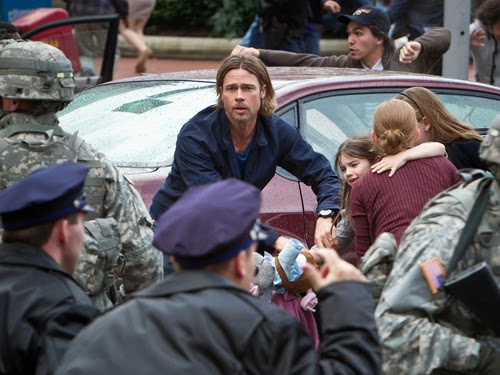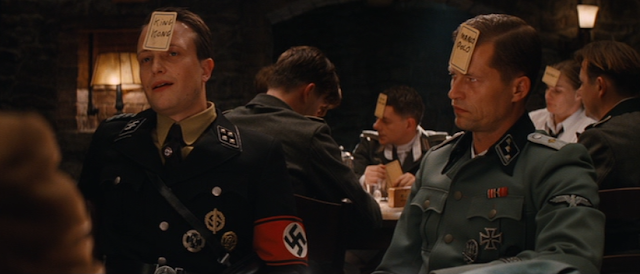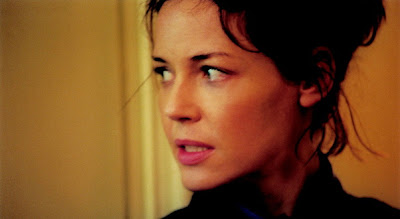I started writing this post a few months ago during the 2014 Golden Globes, prepared for the usual mawkish acceptance speeches and self-congratulatory montages, but I was shocked instead by how much blubbering was occurring over, of all things, kids. On and on these winners went about how they love their kids, how their kids are shining stars that transport them safely across the deserts of artistic blocks and emotional meltdowns and give their lives' meaning.
It was appalling.
Sure, I'm being a curmudgeon, but I have nothing against the kids themselves. I feel for them. Imagine being one of the children of those Globe winners, staying over at a slumber party and everyone's watching of course on TV and noticing your dad is a wussy crybaby who's totally bound to you hand and foot. Christ, I would have packed my sleeping bag and bailed on the spot. Kids have honor, a code! In order to grow into decent human beings these kids need to know dad isn't going to fall apart on them, crying and clinging and making them fight for every second of privacy. They want to know that they can move out one day and while mom might cry, dad will sigh in relief.
Maybe instead of their kids, these dads should thank Brad Pitt, for showing the way a great 70s dad behaves, during World War Z (2013). Maybe the first film to actively redress the Dads of Great Adventure complex that's befouled our decade's disaster movies (you know the type: the widowed, divorced or absentee workaholic/slacker dads who wind up with custody of the kids during the apocalypse because it strikes on the weekend--and his biggest fear is they'll die on his watch, and he'll look like a bad parent), Pitt's dad is competent and responsible for the world outside his immediate family as well as for said family, without showing any strain. All under his watch are taken care of, all without his sanctimonious belittling, clinging, or simpering (or on the other side, ignoring, spacing, procrastinating, stalling).
Pitt's professional compassion exonerates his apocalypse dad from the usual sense of proximal guilt that trips up rubes like Cage in Knowing, Viggo in The Road, Cruise in War of the Worlds and Cusak in 2012. More than all of them, World War Z makes a genuine manly effort to show male viewers a kind of post-Fight Club code they can live by without feeling like second class citizens in their own home. UN troubleshooter Gerry Lane and family (including urchin collected en route) are choppered off to an aircraft carrier packed with refugees so he can jet off to locate Patient Zero somewhere on the other side of the world. His global nation-hopping journey takes him from South Korea to Israel to a remote medical testing facility in Wales, and finally to a refugee camp in the one place savvy doomsday preppers have eyeballed since 1999, Nova Scotia!
It was appalling.
Sure, I'm being a curmudgeon, but I have nothing against the kids themselves. I feel for them. Imagine being one of the children of those Globe winners, staying over at a slumber party and everyone's watching of course on TV and noticing your dad is a wussy crybaby who's totally bound to you hand and foot. Christ, I would have packed my sleeping bag and bailed on the spot. Kids have honor, a code! In order to grow into decent human beings these kids need to know dad isn't going to fall apart on them, crying and clinging and making them fight for every second of privacy. They want to know that they can move out one day and while mom might cry, dad will sigh in relief.
Maybe instead of their kids, these dads should thank Brad Pitt, for showing the way a great 70s dad behaves, during World War Z (2013). Maybe the first film to actively redress the Dads of Great Adventure complex that's befouled our decade's disaster movies (you know the type: the widowed, divorced or absentee workaholic/slacker dads who wind up with custody of the kids during the apocalypse because it strikes on the weekend--and his biggest fear is they'll die on his watch, and he'll look like a bad parent), Pitt's dad is competent and responsible for the world outside his immediate family as well as for said family, without showing any strain. All under his watch are taken care of, all without his sanctimonious belittling, clinging, or simpering (or on the other side, ignoring, spacing, procrastinating, stalling).
Pitt's professional compassion exonerates his apocalypse dad from the usual sense of proximal guilt that trips up rubes like Cage in Knowing, Viggo in The Road, Cruise in War of the Worlds and Cusak in 2012. More than all of them, World War Z makes a genuine manly effort to show male viewers a kind of post-Fight Club code they can live by without feeling like second class citizens in their own home. UN troubleshooter Gerry Lane and family (including urchin collected en route) are choppered off to an aircraft carrier packed with refugees so he can jet off to locate Patient Zero somewhere on the other side of the world. His global nation-hopping journey takes him from South Korea to Israel to a remote medical testing facility in Wales, and finally to a refugee camp in the one place savvy doomsday preppers have eyeballed since 1999, Nova Scotia!
The real-life world-savin' pair of Jolie and Pitt got started on their global betterment tour when Jolie starred in Beyond Borders. She really brought her work home with her. As if continuing that film's message, Brad's UN agent has already survived in some of the most harrowing third world hotspots. so the disasters of this zombie plague don't stress him out the way they do other dads. He has a strong, supportive wife, two glowing children, and great fun family rapport. Over the course of the movie these kids and wife are never really in danger, or at any rate, they don't panic because they trust in their heavenly-faced father. We sense that-- even when the zombie spittle is flying fast and furious--no harm will come to any of them. In fact those who stay super close to Pitt miraculously survive even as everyone else around them are infected and/or dead. The concern is solely as to where and how Pitt's UN unfazable superdad will solve the zombie problem, not if.
One of the tricks Pitt's Lane knows is something that the earlier dads of great adventure never mastered: triage. Even if he should make eye contact with people being bitten and devoured, he refrains from stopping to help them if it means risking his life or the lives of those he's with. You can imagine a lesser dad shouting 'somebody do something!' every time he sees a lost kid in a corner, but not Brad. He knows when to cut and run. There's something reassuring about how Lane's status with the UN gets him driven all around the world without need for check-in or bag search. His ability to think globally and survive locally rather than thinking locally like the dads of great adventure is what earns him this first class status.
On the other hand, telling moments in Z reveal a savvy about the proximal responsibility issue: the grateful singing of the Palestinians being let into Israel to avoid the plague excites the zombies and drives them over the impregnable wall; the one moment of true Brad danger comes when his wife's phone call rings as he's trying to sneak around sleeping zombies. This is a movie that knows how any glimmer of empathy, proximal responsibility, etc. can set off a chain reaction. Only Brad's compassionate but survival-based mojo manages to know when to run in true triage fashion.
Fury (2014) finds "Wardaddy" (Pitt) not saving the world per se, but blasting the hell out of the German homeland defenses with a tank crew of uncouth but loyal brigands. A clean-shaven newbie from the typing pool is 'daddy's' latest adopted son (Logan Lerman): he quivers and quakes and resents papa Pitt forces him to shoot an unarmed German prisoner (to toughen him up) and--as in Saving Private Ryan--there's some of that distasteful anachronism where he's the nerdy typist character (played by squirmy Jeremy Davies in Ryan) is too wussy for 1945, hell, even for 1975, but wussy like they only started to make 'em in the post-PC 'declawing' of masculinity, beginning around the early 80s. Wardaddy does the right thing in forcing him to kill an unarmed soldier --it's a matter of Pitt and crew's on personal survival that the kid be forced to surrender his squeamish morality. This suggests all sensitive typists (like myself) could use a few months on the front lines of a war with a guy like Wardaddy to toughen us up to the point we can turn compassion into an asset rather than a liability, so that we don't hesitate on the trigger when its time to kill or be killed, and that we know when to run past someone in danger, even if they make soulful eye contact with us, if it means certain death.
Pitt had proved he could be wild and liberated even whilst a young scrap of a fella, back in Thelma and Louise, so that's never been in doubt, but even so, here we got some extra layers of toughness as borne out by his scarred and diesel oil-stained face. We see him get kind of cleaned up when a nice little breakfast served up by a couple of frauleins in a little second floor apartment that's gone un-bombed, but when it's invaded by the rest of his motley tank corp, we see Pitt forced into a weird no-win zone between solidarity with his rapey crew and an innate gentlemanly spirit. It's the most tiresome scene in the film, it stretches on and on, and I'll confess I FF-ed part of the way, but it's almost worth it for the brutal pay-off, which finally brings things to bear for our milquetoast. Eventually the lad even learns when to let a kraut fry to death and when to chop him in half. Hell yeah, Sgt. Rock loves this movie, wherever he is.
And if the whole last stand thing means that yet again the Saving Private similarities come too close to call, what is so important about Fury is what's not there: no balderdash bullshit about needing to ask a goddamned woman whether or not you 'earned it' and all that trying to find some greatest generation noble cause lollipop at the center of the severed head tootsie roll. It's finding your manliness in the company of men and smoke grenades --that's what it's for, war. David Ayers supposedly had a fight club thing going on each morning with the cast: each man fighting the other. It's true, as many of us know (but moms, wives, and soft-handed typists never have): the fastest way for men to become friends is to fight each other.
We all knew Pitt could bring the nihilistic badassitude, as could Michael Pena (Observe and Report), the real surprises in the crew are Jon Bernthal as the unkempt creep whose Iron John energy finally connects with Lerman after the fraulein incident and--most amazingly--Shia LaBeouf, whom I've always regarded with some level of contempt, but his work here completely changed my mind. When it comes down to the nitty gritty, of sharing last cigarettes and drinks before almost certain doom, it's Shia who really brought it home for me. I felt his clear-eyed look at mortality deep in my socks. I felt in his suppressed quiver of finality the feeling of being fully cognizant of imminent extinction, how one's death is pressed right up on the glass and always just a tap away --and of standing firm, fully in thrall of the only thing that can transcend the overwhelming instinct towards self-preservation: devotion to one's team. The crew, the captain, and the Pitt, the Wardaddy, the king. It's something that, for all its greatness, the entirety of Band of Brothers was never able to achieve as it lacked an actor of Pitt's unique combination of toughness and charisma, the combination of the great 70s dad. We feel the love for that combination in Shia, who gets his voice down a full octave and takes swigs of booze so believably we're made intolerant of all the lesser actors who betray their lack of experience as boozers by drinking straight whiskey like it was iced tea). With this crew's clear wincing we feel we're really in there with them, in that tank. We can smell the diesel fumes, mixed with the tang of explosives, dried blood, sweat, burnt oil, and cigarettes. It's the tang of the great 70s dad.
There's no voiceover in Fury, either, which also sets it above so many of its 'mother, am I a good man?' counterparts. And the ending credits are some of the coolest I've seen, with Steven Price's great A Silver Mt. Zion-esque soundtrack blasting over high contrast color-res images of the rest of the war. Any idea that the war was already won by the time we crossed the Rhine is put to rest. A whole lot of pointless killing and destruction is left undone. The soldiers that were just kids and old men still are dangerous if they have ein panzerfaust (and most of them did). Yet, knowing the war is lost, all the fighting becomes somehow robbed of the honor it had when the outcome wasn't certain. Now it's not a matte of survival against evil but a delaying action waste of property, architecture, and lives rather than a noble cause. All that's left, then, is loyalty and brotherhood.
Ask the guys in Afghanistan and Iraq what they're fighting for and the answer's always the same: the guy next to them in the foxhole, their buddy, their brother by fire, they fight to keep each other alive. That's the kind of thing that would sound trite in a voiceover but if a movie like Fury can show that rather than tell (or ask for meaning from teary wives), then maybe the senselessness itself can make sense. War is hell right up to the end but so is life when the unimportant stuff's stripped away. More so in Fury than most war films (since maybe the 1930s) if you're going to survive, you need to become Hell's chosen badass. So here we finally learn what Spielberg only hinted at in his clutching for decency: that every milquetoast has it in him to face death with both barrels blazing if it comes to that, to let go of burdensome humanity and at the same time find a whole new Nietzsche paradigm.
Patton knew it. Kubrick knew it. Pitt's Tyler Durden knows it. Sgt. Aldo Raine knows it. "Wardaddy" knows it, and director David Ayers knows it. In filmmaking, as in war, the comfort of phony personae is the first thing that must go. The fastest way to shuck it is in a bare knuckle brawl with someone you're not even mad at. Even since the 90s, the Pitt persona has never wavered from that punchy code. He is our tousled lord, our approximate Arthur, our Kalifornia king.
He's all that's still standing between us and the terrible apron string hydra we choose to call mother.








































